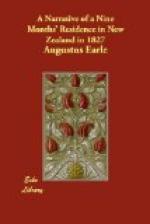The next day our old friend King George paid us a long visit, and we talked over the affair very calmly. He highly disapproved of our conduct. “In the first place,” said he, “you did a foolish thing, which might have cost you your lives; and yet did not accomplish your purpose after all, as you merely succeeded in burying the flesh near the spot on which you found it. After you went away it was again taken up, and every bit was eaten”—a fact I afterwards ascertained by examining the grave and finding it empty. King George further said: “It was an old custom, which their fathers practised before them; and you had no right to interfere with their ceremonies. I myself,” added he, “have left off eating human flesh, out of compliment to you white men; but you have no reason to expect the same compliance from all the other chiefs. What punishment have you in England for thieves and runaways?” We answered, “After trial, flogging or hanging.” “Then,” he replied, “the only difference in our laws is, you flog and hang, but we shoot and eat.”
After thus reproving us, he became very communicative on the subject of cannibalism. He said, he recollected the time prior to pigs and potatoes being introduced into the island (an epoch of great importance to the New Zealanders), and stated that he was born and reared in an inland district, and the only food they then had consisted of fern roots and kumara; fish they never saw, and the only flesh he then partook of was human. But I will no longer dwell on this humiliating subject. Most white men who have visited the island have been sceptical on this point; I myself was before I had “ocular proof.” Consequently I availed myself of the first opportunity to convince myself of the fact. I have reflected upon the subject, and am thoroughly satisfied that nothing will cure the natives of this dreadful propensity but the introduction of many varieties of animals, both wild and tame, and all would be sure to thrive in so mild and fine a climate.
CHAPTER XXIX.
Slavery among the Maoris.
The scene I have just described brings into consideration the subject of slavery, as it now exists in New Zealand. That slavery should be the custom of savage nations and cannibals, is not a cause of wonder: they are the only class of human beings it ought to remain with. Here slavery assumes its most hideous shape! Every one they can effect a seizure of in an enemy’s country becomes the slave of the captors. Chiefs are never made prisoners; they either fight to the last, or are killed on the spot, and their heads are preserved (by a peculiar method) as trophies. Children are greatly prized: these they bring to their dwellings, and they remain slaves for life. Upon the number of slaves a chief can muster he takes his rank as a man of wealth and consequence in society; and the only chance these wretched beings have of being released from their miseries, is their master getting into a rage, and murdering them without further ceremony.




